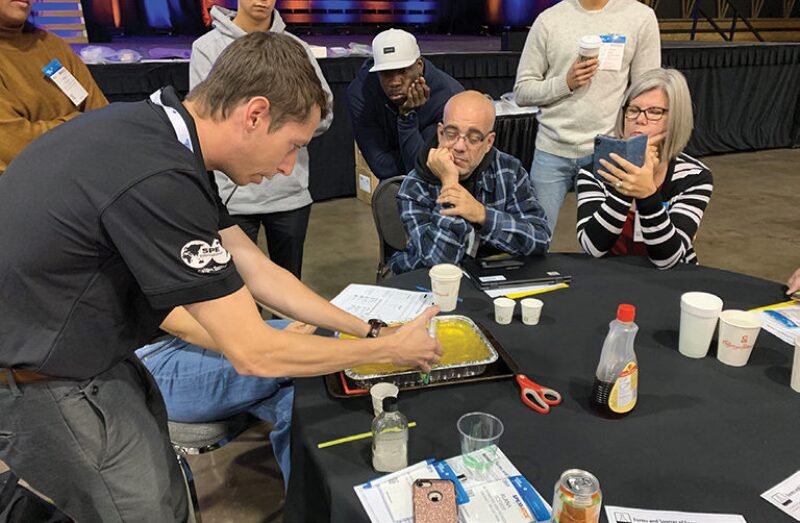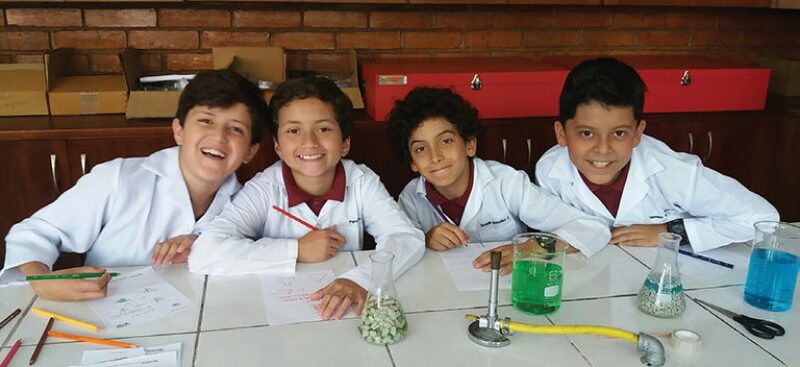Where does energy come from? How is it used? What is the cost and impact on our environment? These are common questions that, for the most part, are misunderstood and poorly communicated. Today, there is more concern about the effects of climate change, energy mix diversification, and sustainability than in any other generation. There is a lot of information in the public, but is the information multisided and objective? Not necessarily.
Most of the communication about the oil and gas industry revolves around exploiting the negative aspects of the industry and campaigns to rapidly reduce the use of fossil fuels in the world. Short media clips depict complicated concepts that deserve more than 30-second sound bites. These one-sided messages create concerns in communities about assumed dangerous activities and create a divide between the community and the industry.
The goal of energy literacy is to promote an energy-conscious and educated society and create interest in science, technology, engineering, and math (STEM) careers. In 2007, SPE launched its answer to the lack of energy literacy through the energy4me® program. Collaborating with the National Energy Education Development Project (NEED), energy4me teaches students and teachers unbiased, fact-based energy education with focus on the oil and gas industry. NEED started in 1980, launched by a US congressional resolution to promote a realistic understanding of the scientific, economic, and environmental impacts of energy so that students and teachers can make educated decisions. Led by Mary Spruill, executive director of NEED, the project has assisted SPE in developing curriculum based in science using hands-on activities to engage students.
How Does It Work?
Energy4me uses this science-based curriculum to demystify the industry and create an excitement around careers in oil and gas. Energy4me has found that one of the most successful ways to engage young students is to educate their teachers. Energy education is not a topic that is widely taught in school systems globally. By making this curriculum available to teachers for use in their classroom, energy4me can reach thousands of students every year. School administrators and teachers internationally have participated in the program and welcome the resources.
The lesson plans and activities are hands-on activities that have been proven to create connections between the classroom and real-world situations. This style of teaching also nurtures critical thinking and problem-solving skills, which are traits that any employer would value. Benjamin Franklin once said, “Tell me and I forget. Teach me and I remember. Involve me and I learn.” The energy4me workshops not only are a lot of fun for the students, but they also are incredibly educational. Because we use hands-on activities, students do not passively listen to a lecture; they must think through a problem or situation. They learn that they can interpret data, which is a fundamental skill for engineers.
How Are SPE Members Contributing?
SPE International (SPEI) has developed Training the Teacher workshops around the world providing crucial professional development for teachers. SPE members take their knowledge and passion into the classroom with students. Using the tools from energy4me and Train the Trainer workshops from SPEI, our members are inspiring students to discover STEM careers and make informed decisions about the industry. Addressing the needs on a local level makes the program relevant to the local industry and energy mix.
How Can Your Section Get Involved?
Calgary Section
Hydraulic fracturing is one of the most controversial topics in our industry and the Calgary section has taken on the challenge of educating the public with their Fracking with Jell-O® kits. This activity was developed by our curriculum partner, NEED, but the Calgary section has redesigned the experiment into simple take-home kits to get the experiment and information into homes, offices, and schools. The kit includes detailed instructions to conduct the experiment, alongside explanations of what happens in real life as you go through the activity. There is also a handout with some basic facts, an overview with common questions about hydraulic fracturing and the importance of its role in energy.
The goal is to bring a better appreciation of our industry to the public and create a means to open the conversation, starting with an illustration about how hydraulic fracturing works and ending with a public that is better-versed and armed with a few facts about hydraulic fracturing. The kits have garnered a lot of attention among oil and gas companies in Calgary and are given to schools at no cost.
The section’s Young Professionals also organized a Family Science Day that features tours of rig simulators and energy4me experiments. In it’s third year running with over 200 people last year, the all-day family event allows participants to visit the various displays, touch and see, talk to professors, university students, and working professionals in the industry. Also, to get more companies and professionals involved in energy literacy, the section has organized Take your Kid to Work day where the Young Professionals lead experiments and activities for 40–50 students.

Ecuador Section
In Ecuador, the energy4me team and other members of the section launched their pilot energy literacy program in May 2018. In just 2 years their efforts have reached more than 4,500 students. Using several volunteers, the section members engage the help of local corporations to take the program into schools across the region. Using the activities, the section creates a fun atmosphere of learning while engaging the students in STEM. Alex Cortez, the energy4me program coordinator, said, “Our main objective is to fulfill the SPE mission through the energy4me program keeping the contact between industry and community.” The goal of the program for 2020 is to reach 10,000 students.

Benin City, Nigeria Section
Nigerian sections are also active in the energy4me program. Lagos, Port Harcourt, and Benin City all have been successful in taking the program to local classrooms. For example, in the Benin City section, engineers Ifeanyi Ndukwe and Peter Asemota visited the St. Maria Goretti Girls Secondary School where more than 450 students were waiting to greet them.
Students played the Peak Oil Game which uses beans, spoons, and paper bags to show how technology and the right decision-making can lead to the discovery of potential energy. The game educates and spurs competition among students as they learn the important lesson of cooperation between various sectors within the industry. Learning isn’t always just for students. Energy4me volunteer Ndukwe said he also learned a lot from this activity as well. “The activity is one of the most amazing ways to introduce kids to the energy sector and it was a success,” he said. “I enjoyed the session, and it even strengthened my knowledge during the exercise.”
Energy4me has a range of volunteers that have given their time to mentor and answer the questions that the public might have. There is no better reward than giving back to the community that has given you so much. Your efforts in these school visits may uncover future leaders and energy professionals.
For more information on the program and how to get involved, email energyed@spe.org.
